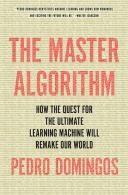
Algorithms increasingly run our lives. They find books, movies, jobs, and dates for us, manage our investments, and discover new drugs. More and more, these algorithms work by learning from the trails of data we leave in our newly digital world. Like curious children, they observe us, imitate, and experiment. And in the world’s top research labs and universities, the race is on to invent the ultimate learning algorithm: one capable of discovering any knowledge from data, and doing anything we want, before we even ask.
Machine learning is the automation of discovery-the scientific method on steroids-that enables intelligent robots and computers to program themselves. No field of science today is more important yet more shrouded in mystery. Pedro Domingos, one of the field’s leading lights, lifts the veil for the first time to give us a peek inside the learning machines that power Google, Amazon, and your smartphone. He charts a course through machine learning’s five major schools of thought, showing how they turn ideas from neuroscience, evolution, psychology, physics, and statistics into algorithms ready to serve you. Step by step, he assembles a blueprint for the future universal learner-the Master Algorithm-and discusses what it means for you, and for the future of business, science, and society.
If data-ism is today’s rising philosophy, this book will be its bible. The quest for universal learning is one of the most significant, fascinating, and revolutionary intellectual developments of all time. A groundbreaking book, The Master Algorithm is the essential guide for anyone and everyone wanting to understand not just how the revolution will happen, but how to be at its forefront.
Prologue
Prologue
An early list of examples of machine learning’s impact on daily life can be found in “Behind-the-scenes data mining,” by George John (SIGKDD Explorations, 1999), which was also the inspiration for the “day-in-the-life” paragraphs of the prologue. Eric Siegel’s book Predictive Analytics (Wiley, 2013) surveys a large number of machine-learning applications. The term big data was popularized by the McKinsey Global Institute’s 2011 report Big Data: The Next Frontier for Innovation, Competition, and Productivity. Many of the issues raised by big data are discussed in Big Data: A Revolution That Will Change How We Live, Work, and Think, by Viktor Mayer-Sch?nberger and Kenneth Cukier (Houghton Mifflin Harcourt, 2013). The textbook I learned AI from is Artificial Intelligence,* by Elaine Rich (McGraw-Hill, 1983). A current one is Artificial Intelligence: A Modern Approach, by Stuart Russell and Peter Norvig (3rd ed., Prentice Hall, 2010). Nils Nilsson’s The Quest for Artificial Intelligence (Cambridge University Press, 2010) tells the story of AI from its earliest days.




